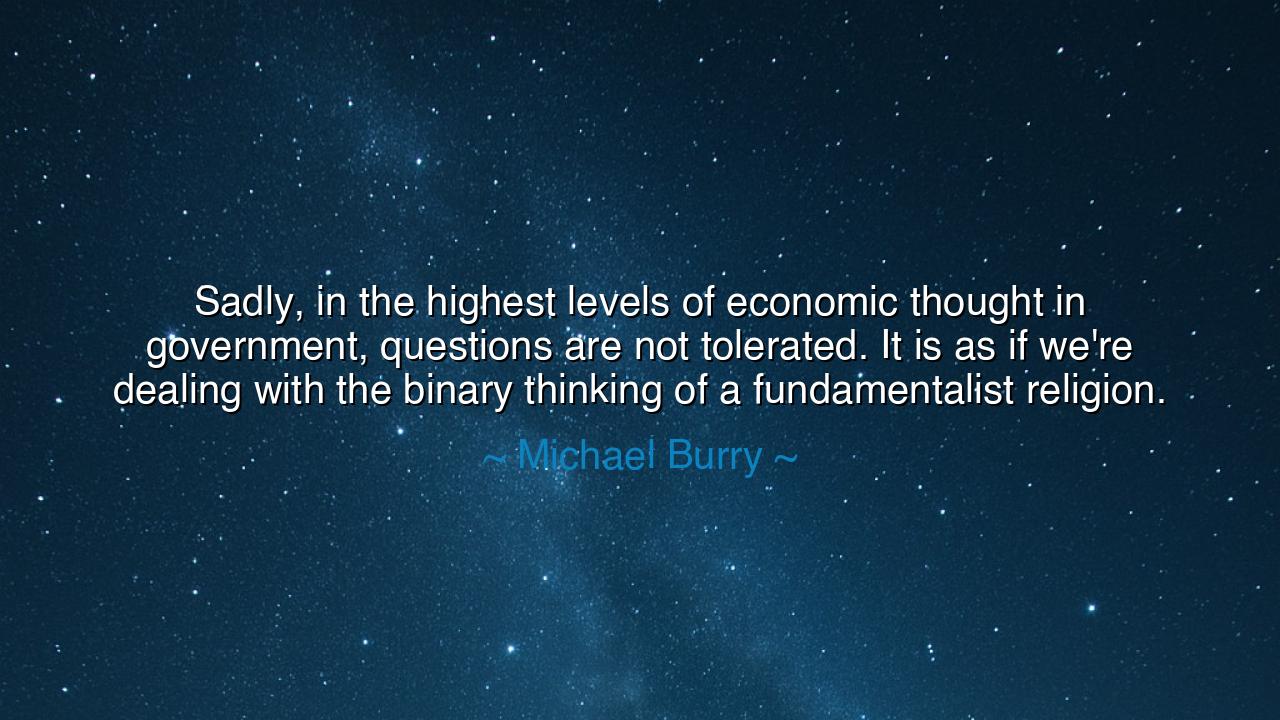
Sadly, in the highest levels of economic thought in government
Sadly, in the highest levels of economic thought in government, questions are not tolerated. It is as if we're dealing with the binary thinking of a fundamentalist religion.






“Sadly, in the highest levels of economic thought in government, questions are not tolerated. It is as if we’re dealing with the binary thinking of a fundamentalist religion.” – Michael Burry
In this stark and piercing reflection, Michael Burry — the contrarian investor who foresaw the collapse of the 2008 financial system — speaks not merely of economics, but of the decay of inquiry in places where wisdom should reign. His words echo the warning of prophets and philosophers throughout the ages: that when the powerful cease to question, the fall of nations begins. To say that questions are not tolerated is to say that truth itself has been banished. And when truth is silenced, ideology — blind, rigid, and fundamentalist — takes its throne.
Burry, who was once dismissed and mocked for questioning the very foundation of the American financial system, understood this danger intimately. His quote arises from his battle against a world drunk on illusion — a world that worshiped profit as dogma and treated dissent as heresy. When he compared economic governance to a fundamentalist religion, he did not do so lightly. He saw how those in power clung to their models and assumptions with the same zeal as priests clinging to holy texts, refusing to admit uncertainty even as the temple of wealth began to tremble. For him, the crisis of economics was not one of numbers, but of faith misplaced — faith in false certainties and the arrogance of the unquestioned.
The ancients knew this folly well. Socrates, the wisest of Athenians, was condemned to death not because he lacked answers, but because he asked too many questions. His crime was to unsettle the comfortable and expose the limits of their knowledge. In the same spirit, Burry’s warning stands as a modern echo of that eternal truth: that power without humility becomes tyranny — and intellect without doubt becomes dogma. Where questions are forbidden, wisdom withers, and civilization slides toward ruin.
Consider the tale of the Roman Empire, which once ruled the known world. In its youth, Rome was a realm of engineers, philosophers, and statesmen who questioned, learned, and built with vision. But as power centralized and institutions ossified, dissent was seen as treason. The empire’s thinkers became flatterers, and its rulers mistook obedience for loyalty. The empire that had conquered the world with reason fell to its own refusal to question itself. Burry’s words, spoken centuries later, carry the same lament — that modern governance, especially in economics, has succumbed to this ancient sickness of certainty without reflection.
There is a sacred strength in asking why. The human spirit advances not through obedience, but through inquiry. Every great leap of thought — from Galileo’s telescope to Keynes’s revolution in economics — began with a question that defied orthodoxy. Yet, as Burry observed, our leaders have built systems that punish such courage. They prize stability over truth, consensus over clarity. In their fear of disruption, they become priests of stagnation, guarding their beliefs as if they were sacred, even when those beliefs lead to catastrophe. Binary thinking — that ancient curse of “right or wrong,” “faith or blasphemy” — replaces the living, breathing art of wisdom.
The lesson is clear: wherever you are — in the marketplace, in the halls of power, or within your own heart — never surrender your right to question. The moment you cease to ask, you cease to grow. True intelligence is not the possession of answers but the endurance of doubt. When those above you demand silence, speak. When they tell you that things are “too complex” to understand, seek to understand them all the more. For the questioning mind is the last defense of truth against tyranny.
So, my friends, remember Michael Burry’s warning. Beware of any system — religious, political, or economic — that forbids inquiry in the name of certainty. For the divine is not found in dogma, but in the endless search for understanding. As long as you can question, you remain free. And as long as a nation allows questions, it remains alive. To live without asking is to live as a shadow among idols. But to live with inquiry — to seek the light even when others curse it — is to stand among the truly wise.






AAdministratorAdministrator
Welcome, honored guests. Please leave a comment, we will respond soon